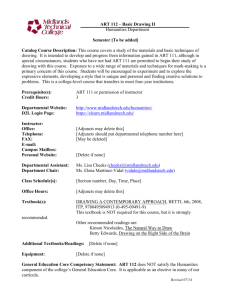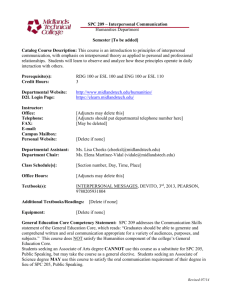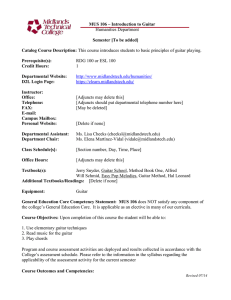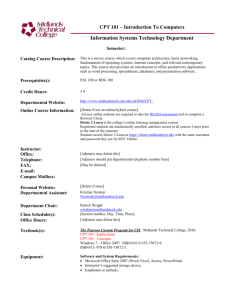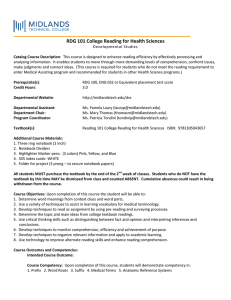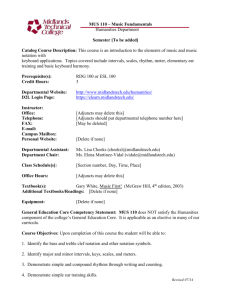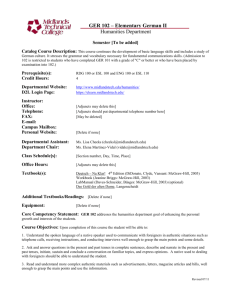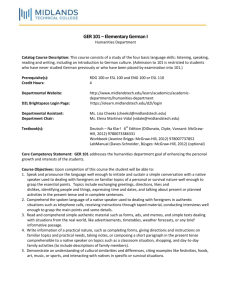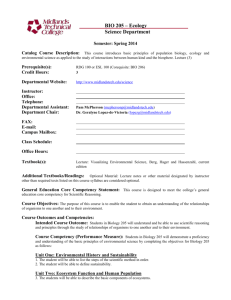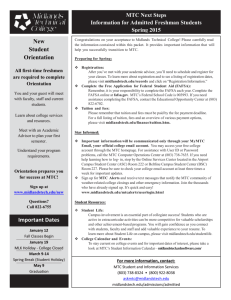ART 211
advertisement
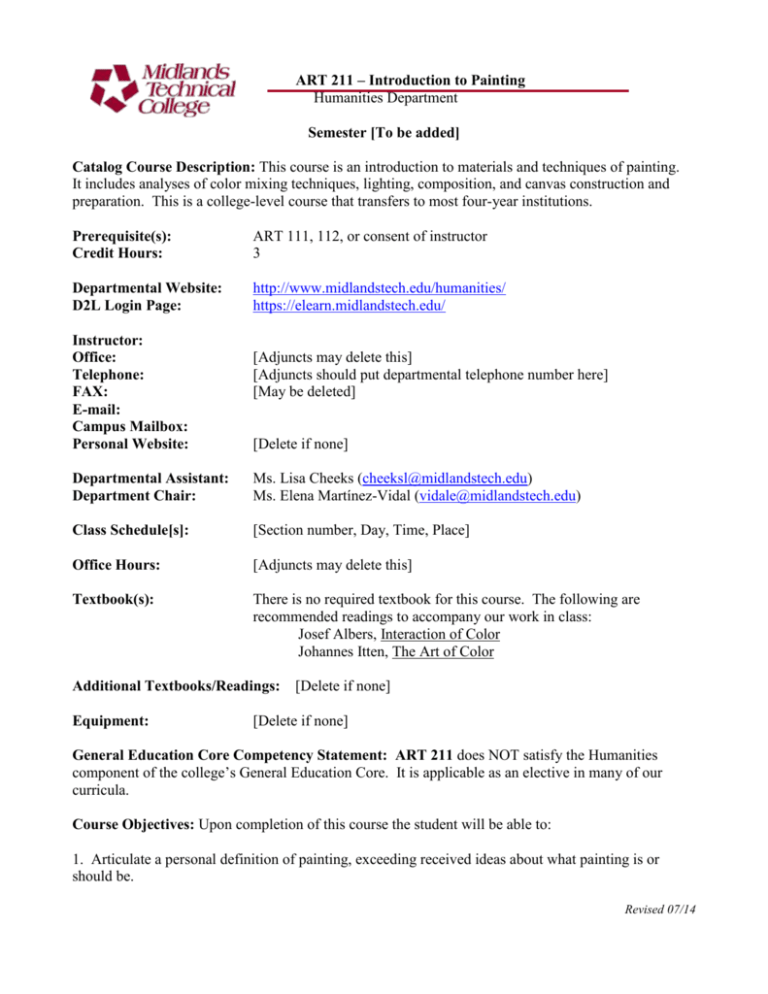
ART 211 – Introduction to Painting Humanities Department Semester [To be added] Catalog Course Description: This course is an introduction to materials and techniques of painting. It includes analyses of color mixing techniques, lighting, composition, and canvas construction and preparation. This is a college-level course that transfers to most four-year institutions. Prerequisite(s): Credit Hours: ART 111, 112, or consent of instructor 3 Departmental Website: D2L Login Page: http://www.midlandstech.edu/humanities/ https://elearn.midlandstech.edu/ Instructor: Office: Telephone: FAX: E-mail: Campus Mailbox: Personal Website: [Adjuncts may delete this] [Adjuncts should put departmental telephone number here] [May be deleted] [Delete if none] Departmental Assistant: Department Chair: Ms. Lisa Cheeks (cheeksl@midlandstech.edu) Ms. Elena Martínez-Vidal (vidale@midlandstech.edu) Class Schedule[s]: [Section number, Day, Time, Place] Office Hours: [Adjuncts may delete this] Textbook(s): There is no required textbook for this course. The following are recommended readings to accompany our work in class: Josef Albers, Interaction of Color Johannes Itten, The Art of Color Additional Textbooks/Readings: Equipment: [Delete if none] [Delete if none] General Education Core Competency Statement: ART 211 does NOT satisfy the Humanities component of the college’s General Education Core. It is applicable as an elective in many of our curricula. Course Objectives: Upon completion of this course the student will be able to: 1. Articulate a personal definition of painting, exceeding received ideas about what painting is or should be. Revised 07/14 2. Complete works of art that employ contemporary acrylic techniques and express a personal visual vocabulary. 3. Critique the concepts and techniques of his or her own compositions and the compositions of others, including painters of historical significance. 4. Demonstrate an understanding of color theory and its usage in both conventional and unconventional approaches to acrylic painting. Program and course assessment activities are deployed and results collected in accordance with the College’s assessment schedule. Please refer to the information in the syllabus regarding the applicability of the assessment activity for the current semester. Course Outcome and Competency: Intended Course Outcome #1: Students will demonstrate their skills in basic acrylic painting. Course Competency (Performance Measure): Students will understand what the basic techniques are in order to be able to create finished compositions. Measurement Instrument: Students will create six finished compositions using knowledge gained about basic acrylic painting. Course Attendance: In the event of circumstances beyond one's control, such as illness, the student is allowed to miss no more than twice the number of weekly class meetings or _____. Exceeding the maximum allowed absences in this course means that the student can receive NO CREDIT for the course, and the instructor will assign the student a grade of W or WF. Each student is expected to attend ALL classes and is responsible for class work, homework, lecture notes, and reading assignments, whether present or absent. ABSENCE - Failure to be present for a scheduled meeting of the class ABSENCE - Arriving for the class MORE than ten (10) minutes after the scheduled time for the class to begin ABSENCE – Leaving class More than ten (10) minutes before the scheduled time for class to end ABSENCE – Leaving class for More than ten (10) minutes during class time for any reason ABSENCE – Three Tardies TARDY – Arriving for the class after the instructor has called the roll and before ten minutes past the time scheduled for the class to begin. TARDY – Leaving class within the last ten (10 minutes) of the scheduled time for class to end Absences are counted from the first day of classes whether you are enrolled in the course or not on the first day of class. There are NO "excused" absences; ALL absences are counted, regardless of the reason. Students are expected to remain in class for the entire period. If you are not in the class for the entire period, for whatever reason, you will be counted ABSENT. Courteous, Attentive Behavior: Courteous, attentive behavior is expected at all times. Tardiness to class, speaking out of turn (or when instructor is speaking), sleeping in class, receiving calls/texts on cell phones/pagers, etc. are behaviors that are disrespectful and disruptive to everyone in the class and will not be tolerated. Students are expected to read the MTC Student Handbook and abide by its policies. You can find the handbook online at http://www.midlandstech.edu/handbook/. Copies are also available at various locations on campus. Students are expected to behave professionally and to treat classmates and instructors with courtesy and respect. Instructors have the right to ask disruptive students to leave class upon the first offense of such behaviors. Subsequent offenses will require the student to meet with Mr. Hart Hayden (822-3441), Campus Life, or Mary Holloway (822-3529), Assistant Vice President of SDS, and may lead to disciplinary actions including dismissal from the course. Students are expected to read and understand the following college and department policies: The MTC Student Handbook., http://www.midlandstech.edu/handbook The MTC Academic Affairs Student Guidelines and Expectations The Humanities Department Student Behavior Expectations Withdrawal: Should the maximum allowable absences be exceeded prior to midterm, a "W" will be submitted to the registrar to be recorded on the student's transcript. Should the maximum allowable absences be exceeded after midterm, a "W" will be submitted to the registrar if the student was passing the course at the time of withdrawal OR a "WF" will be submitted if the student was failing the course at the time of withdrawal. Disabilities Statement: The staff of Counseling and Career Services works to ensure that all educational programming and services are accessible to otherwise qualified students with disabilities. If you have a concern regarding the accessibility of websites, instructional materials, online courses and other electronic or information technology please contact Counseling and Career Services. It is the student's responsibility to self-disclose as a student with a disability and to request accommodations prior to beginning a program or course. Please contact the staff of Counseling and Career Services at 803-822-3505 (AC) or 803-738-7636 (BC) or via email at disability@midlandstech.edu if you have any questions or concerns. Academic Dishonesty: If you choose to cheat or plagiarize, here is what will happen. Instructor will let you know that cheating or plagiarizing is suspected. Student may explain or refute the allegation. If instructor still thinks the charges are founded, student is referred to the Office of the AVP, SDS. Documentation is submitted to the Office of the AVP, SDS, by the instructor. Student will then meet with either Dr. Holloway or Mr. Hayden. After the meeting, student will receive a letter with the sanction grade of zero (0) and any other sanctions deemed appropriate. Student has a right to file an appeal. Once the hearing and the notice of the right to appeal have been completed, instructor will be notified to apply the sanction grade of zero (0). Course Requirements: [Insert course specifics: projects, papers, quizzes, tests, etc. as well as any instructions needed] [Include provisions for make up work] Course Grading: applicable] Grading Scale: [Include how course requirements are graded] [Include penalties for late work if 90-100 80-89 A B Superior Work Good Work 70-79 60-69 0-59 C D F Average Work Below Average Work Unsatisfactory Work Special Procedures: [Delete if none] Field Trips: [Delete if none] Classroom Rules/Other: [Delete if none or expand as needed] Course Topic Outline/Course Calendar with Assignments: [This is required] PLEASE NOTE: Should change become necessary, the instructor reserves the right to adjust the requirements, pace, or scheduling of this course. Any change will be announced in class before it becomes effective.
